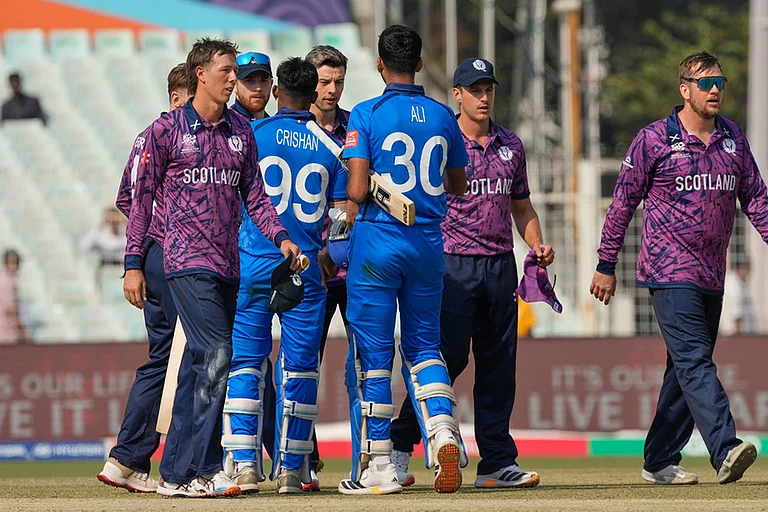PREPARATIONS for the transfer of power further highlighted continuity rather than change as the underlying theme of the occasion. Much attention was paid to devising rituals and ceremonies that would not hurt British sentiment. August 15 would be observed more as a fond farewell to a trusted friend than the culmination of a struggle for independence from foreign rule.
Jawaharlal Nehru set the tone with a speech commending the Tricolour to the Constituent Assembly as the national flag of India. He spoke at length of world history, but failed to mention the Quit India movement of 1942, the Sepoy mutiny of 1857 or other mileposts in the struggle against the British. Gandhi was not too happy with the replacement of the charkha in the Tricolour with the Ashoka wheel. Though Nehru insisted that the change was nominal, Gandhi feared that the association with the lion in the Ashoka emblem would suggest violence.
Nehru readily accepted Mountbatten's suggestion that no disrespect would be shown to the Union Jack when it was lowered for the last time at dusk on August 14. It would not be replaced immediately by the Tricolour; free India's flag would be raised the following morning. British sentiment would also be respected by ensuring that the Union Jack that had flown over the Lucknow Residency ever since 1857 would be lowered with due honours. The flag represented the victory of the British forces in the mutiny, which some historians describe as a war of independence.
There was no such gesture of remembrance for the sepoys who had given their lives in the mutiny. Nor for the Rani of Jhansi who died fighting the British. Nor for the three sons of Bahadur Shah Zafar, the last Mughal Emperor, who were shot in cold blood by a British officer, Capt. Hodson, after they had surrendered. Ironically, the officer continues to be honoured by the Indian regiment that adopted his name, Hodson's Horse.
The current emphasis was on securing power as smoothly as possible. Presumably encouraged by the ease with which he had persuaded the Congress and Muslim League leaders to embrace Dominion status, Mount-batten even tried to persuade the future leaders of India and Pakistan to retain the Union Jack in a corner of their national flags. For once he was unsuccessful. Nehru and Jinnah replied that retaining the British flag would not be acceptable to their people.
But Nehru agreed that after August 15, the governor-general's flag would contain the British royal crest, a crown and lion. This meant that as governor-general of India, Mountbatten would remain in the Viceroy's House flying a flag which continued to symbolise subservience to the crown. No objection was taken to the proposed oath of office for the governor-general which promised that he would be "faithful to His Majesty, his heirs and successors." Then, when asked by Mountbatten whether he could continue to report directly to the King after August 15, Nehru said he had no objection.
Jinnah was less complaisant. Lord Ismay, Mountbatten's chief of staff, complained to him on July 24 that the viceroy was finding it difficult to deal with him. He had been embarrassed by Jinnah's last-minute announcement that he would be governor-general of Pakistan. He had been further embarrassed by reports in the pro-Pakistan press "chortling" over the fact that while India would have a European as governor-general, Pakistan would have one of its own nationals.
The latest embarrassment was Jinnah's refusal to fly the Dominion governor-general's flag, with the royal crest, over his residence. The Pakistan leader replied that he was entitled to fly any flag he liked over his residence. Yet, before Ismay left, Jinnah assured him: "I beg you to assure the viceroy that I am his friend and yours for now and always." As a cousin of King George VI, Mountbatten was brought up in an atmosphere of pomp and ceremony. He enjoyed appearing in naval uniform, complete with medals and decorations. This particularly helped to impress the Indian princes, who liked even more to parade in gold-braided uniforms with rows of decorations. For them, a change in title or new decoration from the King-Emperor was bliss. They were invited to meet the crown representative (he was not viceroy for them) at the Chamber of Princes (now library of Parliament) on July 25.
From all accounts, Mountbatten was in great form for the occasion and persuaded most of the princes to sign the Instrument of Accession to India. He told them that after August 15, he would no longer be able to mediate for them. He warned them that any arms they could procure would be obsolete. That, in the circumstances, the Congress offer of accession in three subjects—defence, foreign affairs and communications—were the best available.
He sweetened the package by assuring the assembled princes that the Indian government would not interfere with them receiving honours and titles from the King, as before. The Maharajas of Jaipur and Bikaner were, in fact, invested with the Grand Cross of the Star of India (GCSI) after the transfer of power.
Commenting on the viceroy's speech, Gandhi regretted that he had not mentioned the rights of the people of the princely states. Now that the British were going, the rulers would have to seek the cooperation of the people. He hoped the 10 crore people in the states would be able to celebrate their independence on August 15.
A few states, Hyderabad, Kashmir, Travancore, Bhopal, Jodhpur, Indore and Junagadh continued to hold out. As secretary in the department of states, V.P. Menon had done the groundwork in preparing the Instrument of Accession and talking to the princes. Now he felt that under that old champion of princely independence, Sir Conrad Corfield, the political department was creating obstacles. Backed by Sardar Patel, he told the viceroy that either Corfield be asked to go, or he would. Corfield went.
The Maharaja of Jodhpur was unwilling to give up the good life he was accustomed to. He was able to bargain because his domain was situated on the border of the new Dominions of India and Pakistan. The ruler of Jaisalmer enjoyed the same advantage. Jinnah had tried to tempt them by offering both a blank sheet of paper to inscribe their terms, which he promised to sign.
However, Mountbatten was able to persuade them of the difficulties they would face as Hindu rulers with Hindu subjects in a Muslim Pakistan. They decided to accede, but Jodhpur's maharaja was so upset at losing his independence that he threatened Menon with a revolver, got thoroughly drunk and forced Menon to drink, before signing the Instrument of Accession.
THE turnaround of Travancore was a quieter, if greater, achievement in view of the crusty obstinacy of the dewan, Sir C.P. Ramaswamy Aiyer, and his influence with other states. On July 30, the viceroy received a reply from the Maharaja, Rama Varma, to his letter written a week earlier describing the advantages of accession and the dangers of holding out. The Maharaja's acceptance of accession was dignified and without the censorious language favoured by his dewan. This may have been due to the fact that Aiyer had been hospitalised after being brutally attacked, an incident seen as inspired by the state Congress.
Interest in Kashmir mounted as August 15 neared. Nehru became emotional; he had been pressing to go for some weeks but was dissuaded by Mountbatten who feared he would further antagonise Maharaja Hari Singh and his surly prime minister, Ramchandra Kak. Patel took the same view. On one occasion, Mountbatten even ticked off Nehru for thinking of "running off to Kashmir until his new government was firmly in the saddle." But on July 28, Nehru wrote emotionally to Gandhi: "As between being in Kashmir when my people need me there and being prime minister, I prefer the former." The next day, the viceroy invited Gandhi, Nehru and Patel and said that a visit by a Congress leader to Kashmir would be badly received by the world press when the Maharaja had yet to decide between India and Pakistan; the effect would be less if Gandhi went because of his religious aura.
Patel bluntly remarked that neither Gandhi nor Nehru should go. It was a choice between two evils; Gandhiji's visit would be the lesser evil. This settled the matter; Gandhi left the next night by train for Srinagar via Rawalpindi (there was still no border to be crossed). Difference between Nehru and Patel on Kashmir continued, and Hari Singh continued to dream about independence.
When informed of Gandhi's visit by the British Resident in Srinagar, the Maharaja replied that the presence of either Gandhi or Nehru would be most inadvisable and "most dangerous in potentialities." The state government would try to prevent untoward incidents but could not provide any guarantees. Gandhi had already assured Mountbatten that he would not make any political speeches.
In his secret message to the Resident, the viceroy had asked him to inform the Maharaja "that with the greatest difficulty I have succeeded in persuading Nehru to stand down in favour of Gandhi." Gandhi had agreed to hold no public meetings and eschew politics.
Before leaving for Kashmir, Gandhi told his prayer meeting he was not going to ask the Maharaja to accede to India. "The people of Kashmir should be asked whether they want to join Pakistan or India. Let them do as they want. The ruler is nothing. The people are everything." Of the other rulers, the Nizam of Hyderabad continued to reject accession to India. He was only willing to sign a treaty. The Nizam was also negotiating with Jinnah. Mountbatten suggested that offering the Nizam's second son the title of His Highness might bring him round.
Mountbatten reported to London that he was surprised by the great store rulers set not only on retaining their existing honorary military ranks and British decorations and being allowed to remain as honorary AsDC to the King, but their greater anxiety that they should not be cut off from receiving future British decorations. Patel had agreed that these "courtesy relations" with the crown could continue.


























